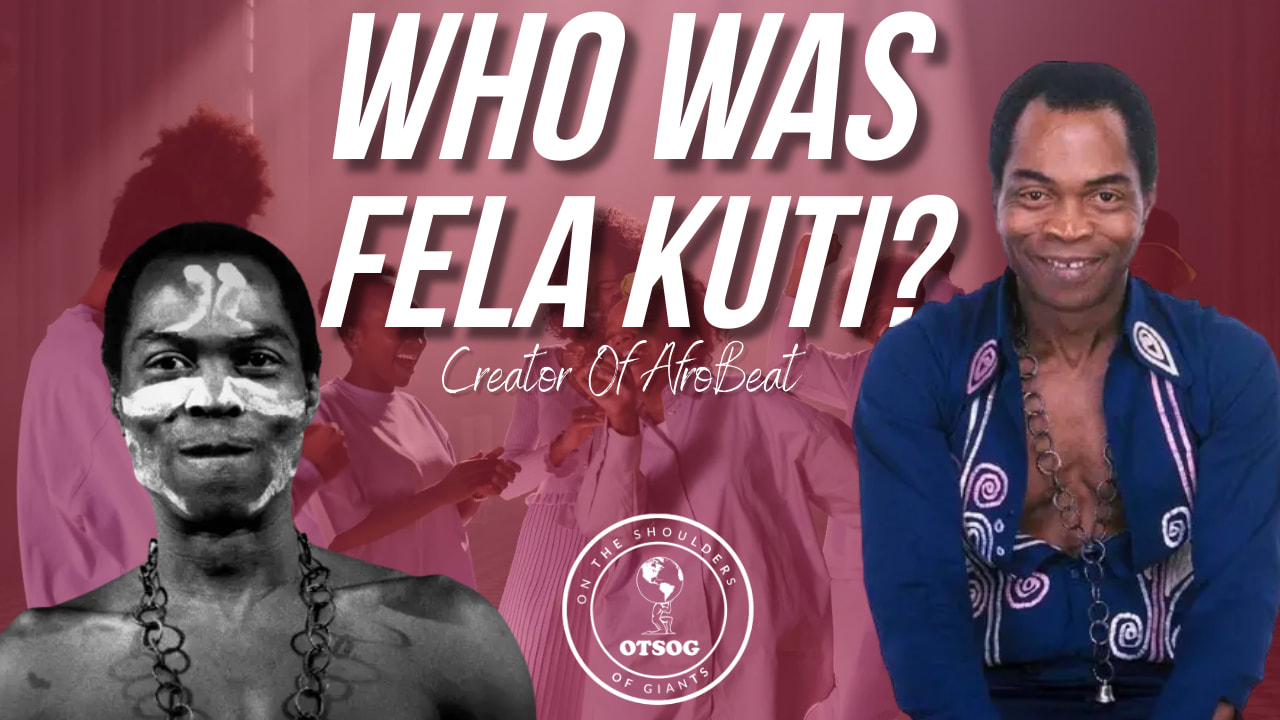|
Olufela Olusegun Oludotun Ransome-Kuti was born October 15, 1938, in Abeokuta, Nigeria to parents Funmilayo and Reverend Israel Oludotun Ransome-Kuti. Fela was born with great talent in his genes. His father was a Protestant Preacher and School Principle, and his mother was a feminist activist in the anti-colonial movement; she was said to be the inspiration behind Fela’s political activism. In 1958, Fela was sent to Trinity College in London, England to study medicine, but made the decision to study music instead. In College, he formed his first band Koola Lobitos, a band that played a fusion of jazz and highlife. In 1963, Fela moved back to Nigeria and reformed his band, he also trained as a radio producer for the Nigerian Broadcasting Corporation. In 1967, Fela traveled to Ghana and developed Afrobeat. Afrobeat is a complex fusion of Jazz, Funk, Ghanaian/Nigerian High Life, psychedelic rock, and traditional West African chants and rhythms. Fela’s music also incorporated call and response, and he was also known for making songs that could last up to forty-five minutes. Fela developed a reputation for being a showman, his concerts were exceedingly extravagant, and he called his stage act the Underground Spiritual Game. In 1969, Fela arrived in the United States to engage in some recording sessions. While recording in Los Angeles authorities were tipped off by a sour promoter that the band was recording without a permit. The band recorded the sessions in a hurry and later released the sessions as “The ’69 Los Angeles Sessions”. When Fela returned to Nigeria he renamed his band the Africa ’70, he also changed his lyrics from music about love to music about political issues. He formed the Kalakuta Republic, a place where he housed a commune, a recording studio, and a home for the band that was later declared independent from the Nigerian State. Fela became very popular through his music, he made the decision to sing in Pidgin English so his music could reach a larger audience. With fame came problems, he was often targeted and raided by the ruling Government. In 1977, Fela released the album “Zombie”, which was an attack on Nigerian soldiers using zombies as a metaphor for methods the military used. The album was a smash hit and an insult to the Nigerian Government. The Government retaliated with an attack on the Kalakuta Republic, during the attack, one thousand soldiers descended upon the commune. Fela was severely beaten and his mother was thrown from a window causing fatal injuries. Fela’s studio was destroyed and burned down. They lost all their music and their master recordings. In response to his mother’s death, Fela delivered his mother’s coffin to the Dodan Barracks in Lagos, Nigeria, at General Olusegun Obasanjo’s residence. He wrote two songs in addition to delivering his mother’s coffin, “Coffin For Head Of State” and “Unknown Soldier”. In 1978, Fela married 27 women to mark the attack on the Kalakuta Republic, later he adopted a rotation system, keeping only 12 wives at a time. He also had two notorious concerts, and because of a riot at one of the concerts, Fela was banned from Ghana. The other concert was at the Berlin Jazz Festival where his musicians deserted him because of rumors about money. Despite setbacks Fela pushed forward, he formed his political party which he called “Movement of the people”. Fela nominated himself for President in Nigeria’s first elections but was refused. He used his time to create a new band Egypt ’80, which further infuriated the Government by dropping the names of ITT Corporation vice-president Moshood Abiola, and then General Olusegun Obasanjo. In 1984, Muhammad Buhari’s government, Fela’s opponent, jailed Fela on a charge of smuggling currency. Human rights groups took up Fela’s case, and after 20 months, he was released from prison by General Ibrahim Babangida. A condition of his release was his divorcing his remaining twelve wives. Fela continued to release albums with Egypt ’80, performing in Giants Stadium at the Conspiracy of Hope concert with Bono, Carlos Santana, and The Neville Brothers. In 1989, Fela released the anti-apartheid “Beast of a nation” album, depicting Ronald Regan, Margret Thatcher, and Pieter Willem Botha on the album cover. Album output slowed then stopped in the 90s, and he and four members of his organization were arrested for murder. His battle against military corruption took its toll, it was said that he was suffering from illnesses but refused treatment. Fela died on August 7, 1997. More than a million people attended his funeral. Fela left a legacy of servanthood, activism, and relentlessness. He was a musical genius, who used his talents to uplift his people. Fela Oludotun Ransome-Kuti, we proudly stand on your shoulders. J.A. Ward.
0 Comments
Leave a Reply. |
Details
Categories
All
Click Here to join our mailing list
|
Contact Us: |
Connect With Us |
Site powered by PIT Web Design


 RSS Feed
RSS Feed



